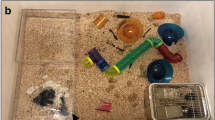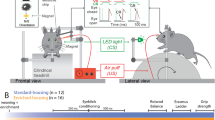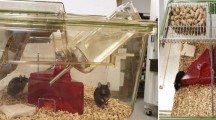Abstract
For animals that cannot be housed socially for scientific reasons, such as rodents on food intake–energy expenditure studies, the provision of environmental enrichment may alleviate stress. However, the influence of environmental enrichment on food intake and energy expenditure is unresolved. The authors tested the effects of two environmental enrichment options on food intake and weight gain in singly housed mice. Their results may be helpful in developing rodent enrichment programs.
This is a preview of subscription content, access via your institution
Access options
Subscribe to this journal
We are sorry, but there is no personal subscription option available for your country.
Buy this article
- Purchase on Springer Link
- Instant access to full article PDF
Prices may be subject to local taxes which are calculated during checkout


Similar content being viewed by others
References
National Research Council. Guide for the Care and Use of Laboratory Animals (National Academy Press, Washington, DC, 1996).
Brain, P. & Benton, D. The interpretation of physiological correlates of differential housing in laboratory rats. Life Sci. 24(2), 99–115 (1979).
Good, D.J. Using obese mouse models in research: special considerations for IACUC members, animal care technicians, and researchers. Lab Anim. (NY) 34(2), 30–37 (2005).
Key, D. Environmental enrichment options for laboratory rats and mice. Lab Anim. (NY) 33(2), 39–44 (2004).
Woods, S.C. et al. Consumption of a high-fat diet alters the homeostatic regulation of energy balance. Physiol. Behav. 83(4), 573–578 (2004).
Kanarek, R.B. & Hirsch E. Dietary-induced overeating in experimental animals. Fed. Proc. 36(2), 154–158 (1977).
Rowland, N.E., Lo, J. & Robertson, K. Acute anorectic effect of single and combined drugs in mice using a non-deprivation protocol. Psychopharmacology (Berl) 157(2), 193–196 (2001).
Rowland, N.E., Cansler, K., Kim, E., Pawlik, N. & Robertson, K. Flavor avoidance induced by LiCl and dexfenfluramine in rats and mice using non-deprivation protocols. Behav. Neurosci. 116(5), 777–784 (2002).
Corbit, J.D. & Stellar, E. Palatability, food intake, and obesity in normal and hyperphagic rats. J. Comp. Physiol. Psychol. 58(1), 63–67 (1964).
Moons, C.P., Van Wiele, P. & Odberg, F.O. To enrich or not to enrich: providing shelter does not complicate handling of laboratory mice. Contemp. Top. Lab. Anim. Sci. 43(4), 18–21 (2004).
Van de Weerd, H.A., Van Loo, P.L., Van Zutphen, L.F., Koolhaas, J.M. & Baumans, V. Nesting material as environmental enrichment has no adverse effects on behavior and physiology of laboratory mice. Physiol. Behav. 62(5), 1019–1028 (1997).
Author information
Authors and Affiliations
Corresponding author
Ethics declarations
Competing interests
The authors declare no competing financial interests.
Rights and permissions
About this article
Cite this article
Robertson, K., Rowland, N. Effect of two types of environmental enrichment for singly housed mice on food intake and weight gain. Lab Anim 34, 29–32 (2005). https://doi.org/10.1038/laban1005-29
Received:
Accepted:
Issue Date:
DOI: https://doi.org/10.1038/laban1005-29



